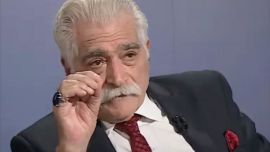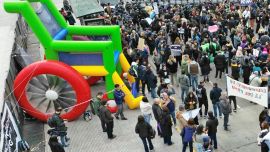Alberto Fernández’s packed, pre-inaugural agenda, sparked a surprisingly moment of controversy this week after a Wednesday meeting with businessman and writer Alejandro Roemmers.
The highlight of the encounter, which took place in the incoming president’s offices, was the businessman’s generous offer to donate more than 6,000 of legendary author Jorge Luis Borges’ manuscripts and books to the State.
Roemmers, who boasts a staggeringly valuable private library, is currently the sitting president of the Argentina Poetry Foundation and has been named an ambassador of Argentine literature by La Sociedad Argentina de Escritores ("Argentine Writers' Society").
The millionaire has published one musical and 11 books, the latest of which was added to classrooms in public schools for its ability to “promote human values in the education of young people.”
Roemmers gave Fernández a signed copy before presenting his donation, which alone will enable the construction of – as the President-elect announced via a tweet following the meeting – “The Borges Museum” in honour of “the greatest man in literature this country has ever had.”
The other Borges museum
The announcement, initially thought to be an exciting development for the literary world, struck a nerve with María Kodama, Borges' widow and a respected author and professor. Kodama was bequeathed Borges' rights as author in a will written in 1979 and later, in 1985, his his whole estate. She has protected his legacy thorough her organisation, The International Jorge Luis Borges Foundation, since 1988.
“So he makes it [the museum]. The matter is indifferent to me. Everyone does whatever they want: nobody asks anyone, nor respects anyone. That’s how it is in this country,” Kodama told Noticias Argentinas this week.
Upon being consulted about the announcement of the incoming head of state, the widow of the literary giant was heavy-handed, uterring: “I don’t care one way or another. Borges’ work was always outside of politics.”
In the same vein, upon being asked about Roemmers’ intentions in donating the books and manuscripts of the author, Kodama scathingly remarked that “they are all stolen items."
"They are all things that this woman [an allusion to Epífana “Fanny” Uveda de Robledo), the widely known domestic employee of the Borges family] stole from the house.”
The last wife of the prolific poet and author emphasised in the conversation with the news agency that a Borges Museum already exists within the headquarters of her organisation. In the display cases of the building on Anchorena 1660 (Beside what once was the residence of the Borges family between 1938 and 1943) Borges’ library, his collection of canes, paintings, decorations, photographs, facsimiles, homages, and originals, among other items are all available to view.
Acquired fair and square
Roemmers denied the articles in question were stolen this week. In response to Kodama’s accusations, he said that “everything has its documentation” and that Wednesday’s meeting was the first time he felt his collection had been taken seriously.
In comments given to the Todo Noticias news channel, the businessman argued that: “[The donation] is not stolen. It’s a 50-year-old collection. There are works that were acquired by many collectors and book-sellers and it’s all documented. There are books, magazines, Borges’s notes, and letters. A large part of the collection is from the president of the Argentine Society of Writers, Alejandro Vaccaro. Everything has its documentation."
“It made me sad to see something so beautiful painted as an act of giving away an asset. Furthermore, decades have passed in which someone could have reclaimed the works. I don’t understand why they are deciding to do it now. It’s absurd. [The collection] is something so big that I can’t have it in my house, I acquired it to donate. It requires a fleet of trucks to transport.”
“If anyone feels that there is something that belongs to them, now they will be able to reclaim it because the State will have it. They’ll have to prove what they’re entitled to, I’m just making it available,” he continued.
He told the channel that he didn’t know “what María Kodama would’ve done with the other part of the work."
"She had told me a few days ago at a dinner that she did not want to donate it to Argentina because she didn’t trust the government’s capacity to preserve the documents, to keep them safe, that they would not be damaged. She said that Borges had donated a few books and they had been lost or destroyed. This is why she said that she would prefer to donate them or sell them to the United States and Japan.”
National heritage
Roemmers went on to argue that the meeting with Fernández was planned in order to coordinate a donation of the material so that it may be exhibited “where Borges lived all his life and not sitting abroad or in a university that’s difficult to access.”
“Borges is universal, he shouldn’t belong to one person, he should be for everyone. And he was Argentine, he lived all his life in Argentina. I would like to have the work in a place where it is valued and where it can be visited. That people would see the material on the Internet, study it," he added.
Furthermore, he claimed that he had tried to offer the collection to Mauricio Macri, when the president served as mayor of Buenos Aires City.
“I offered this collection to Mauricio Macri years ago when he was newly elected, they didn’t give me a place to exhibit the works. They would have had to restore an entire building. I offered again years back but the matter came to nothing. In my case, it doesn’t have to do with any political idea; I want the whole world to be able to see Borges.”
With respect to his meeting with Fernández, he said that “He was really happy. It was a really heartfelt interview and that “it was the first time I felt that this collection had been given importance” That he was going to provide an adequate place, that he was going to make a law to preserve the works with security because they are valuable documents. It has taken me so much to find them and I would like it very much if they weren’t lost or damaged or stolen.”
– TIMES/PERFIL/NA


















Comments